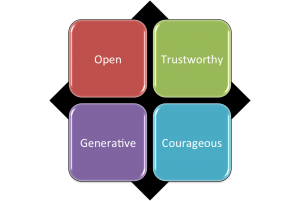 Our Online Marketing Agency has long been an advocate of taking a customer-centric approach to creating and optimizing content for customers. It is only natural that companies should be taking that same approach with their employees.
Our Online Marketing Agency has long been an advocate of taking a customer-centric approach to creating and optimizing content for customers. It is only natural that companies should be taking that same approach with their employees.
I had the pleasure of attending a session at BlogWorld New York which featured authors Jamie Notter (@jamienotter) and Maddie Grant (@maddiegrant). The subject of their session as well as their new book “humanize: how people-centric organizations succeed in a social world” intrigued me.
After attending their presentation I was quick to place my order for their book so that I could follow up on some of the key points that I found to be most interesting. I also had an opportunity to speak with Jamie & Maddie to gain some additional insight into their background, and take on why human-centric businesses succeed.
Employee Engagement in a Social World
We live in a social world where much of our communication takes place online. There is much we can gleam from the success we have interacting with customers and prospects online. We know that simply shouting your marketing message is not effective, in turn the same theory should be applied to internal teams. It is important that a deep look is taken at the way organizations are being run today and determining what exactly is the status quo. The bad news: management is failing their employees. What are some of the scary realities?
- 30% of employees are actively disengaged
- 24% of team members say they don’t see their managers enough
- 84% of managers don’t know how to accurately measure their team members
- 32% of team members don’t know their next move within the company
- 46% of new hires leave their jobs within the first year
 Process Doesn’t Always Make Perfect
Process Doesn’t Always Make Perfect
“Innovation has an inherent distaste for best practices because it is about new solutions, not copying existing solutions. Innovation implies change and doing things differently, but it has to acheive some new level of performance, or create some kind of new value.”
-humanize
One of the key points Jamie shared was that the majority of companies they spoke with had the same complaints: “our organization isn’t agile enough” or “we can’t focus on the right tactics at the right time.”
Many managers create a process based on the machine concept. If you turn this lever and flip this switch, you will get the same result each time. However, that is based on the assumption that each situation is exactly the same and that each action will generate the same result. A large number of organizations have processes that exist merely because they have always been there, or did work well in the past.
Challenges to Socializing Business
Unfortunately there are two large trends heading down two completely different paths: Companies’ ability to adapt and change the way they connect, share, and interact with customers to meet their needs, and their collective inability innovate and adapt those same concepts internally. Humanize outlines three major roadblocks on the road to socializing a business:
- Organizational Structure
- Internal Process
- Individual Behavior
Within each of these roadblocks there is an opportunity for discovery, growth, and change. Because each of these areas is such a large part of what makes a company tick, implementing a large change can be very daunting. However, you have to start somewhere. Perhaps starting with company culture and determining the strengths and weaknesses of your culture as it exists today is a good starting point to get you on the road to change.
The 4 Human Principles

There are four core elements to what makes humans tick. Humanize describes them as:
- Open: Humans must be open to the rest of the system to grow personally.
- Trustworthy: Without trust we instead divert to self-preservation.
- Generative: On an ongoing basis we must be building, creating, and growing new things and relationships.
- Courageous: Finding a way to move forward in the presence of fear is key in the development process.
There is a great overview as well as an individual chapter for each of these four elements covering everything from walking the walk to talking the talk in order to shift your culture.
Q&A: Jamie Notter and Maddie Grant
Jamie and Maddie were both kind enough to answer a couple questions for me about approaching social behavior and their predictions for the coming year.
Jamie Notter
 Q: What effective methods has your background taught you about approaching and evolving the social behavior of individuals within an organization?
Q: What effective methods has your background taught you about approaching and evolving the social behavior of individuals within an organization?
A: I have found conflict resolution to be a critical element in humanizing organizations. One of the most powerful pieces of social media is its decentralized nature. We no longer need centralized control in order to accomplish incredible things on a massive scale. This is why social media has become so popular–as human beings we love the idea of doing great things on our own.
This idea can be applied within organizations too. Companies are learning that they can tap into the power that exists in the periphery of their system by extending decision making authority and empowering people to take action and real ownership over their jobs.
But this only works well when enough people in the system can handle conflict effectively. As a company extends decision making authority to more people in the organization, it creates the potential for more conflicts, for more people to get in each other’s way. So they need the skill to confront and deal with those conflicts early.
By handling things quickly, on a regular basis, the whole system ends up accomplishing more AND being smarter about it, because each time people work through a conflict, they learn. We have the potential to get access to some untapped power by embracing a more decentralized approach, but this means we need to build our capacity for conflict resolution internally if we want to make the most of it.
Maddie Grant
 Q: As a social media blogger, what insights can you share for companies that want to make a shift from a more mechanical social strategy to a more holistic or “human” strategy?
Q: As a social media blogger, what insights can you share for companies that want to make a shift from a more mechanical social strategy to a more holistic or “human” strategy?
A: It’s my firm belief that social media is showing us the way to be more human – our customers are asking us to be more open, more available, more transparent, more collaborative.
Organizations that are starting to really integrate social media into the way that they work and communicate with their stakeholders are the ones that will find it easier to evolve into human organizations.
All you need to do is listen to what your customers are asking for. It sounds simple but of course it’s not – it’s very disruptive to the way we have traditionally run our businesses. But the clues are everywhere. And needless to say, sharing information about your business and about your staff through a company blog is one great way to start.


